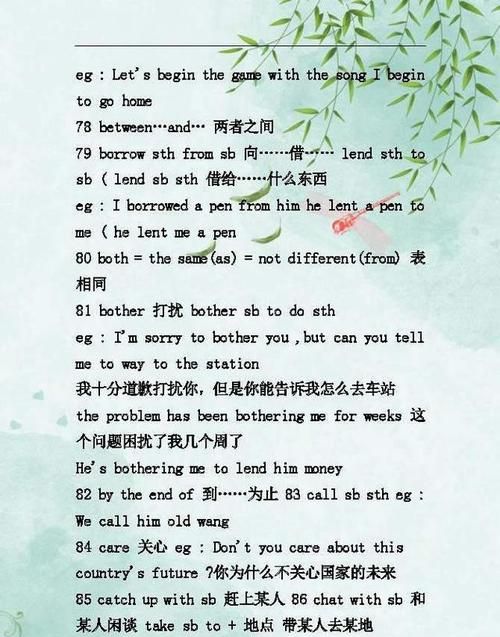本文目录
初中英语六种基本句型结构
1、(主语)+(谓语);
2、(主语)+(系动词)+(表语);
3、(主语)+(谓语)+(宾语);
4、(主语)+(谓语)+(间接宾语)+(直接宾语);
5、(主语)+(动词)+(宾语)+(补语);
6、There be + 主语 + 其它。
扩展资料
一、句型1: Subject (主语) + Verb (谓语)

这种句型中的动词大多是不及物动词,常见的动词如: work, sing, swim, fish, jump, arrive, come, die, disappear, cry, happen等。如:
1、Li Ming works very hard.李明学习很努力。
2、The little girl cried even harder. 小女孩哭得更厉害了。
3、The accident happened yesterday afternoon.事故是昨天下午发生的。
二、句型2:Subject (主语) + Link. V(系动词) + Predicate(表语)
这种句型主要用来表示主语的特点、身份等。其系动词一般可分为下列两类:
(1)表示状态。这样的词有:be, look, seem, smell, taste, sound, keep等。如:
1、 This kind of food tastes delicious.这种食物吃起来很可口。
2、He looked worried just now.刚才他看上去有些焦急。
(2)表示变化。这类系动词有:become, turn, get, grow, go等。如:
1、Spring comes. It is getting warmer and warmer.
春天到了,天气变得越来越暖和。
2、The tree has grown much taller than before.
这棵树比以前长得高多了。
三、句型3:Subject(主语) + Verb (谓语) + Object (宾语)
这种句型中的动词一般为及物动词。其宾语通常由名词、代词、动词不定式、动名词或从句等来充当。例:
1、He took his bag and left.(名词) 他拿着书包离开了。
2、 Li Lei always helps me when I have difficulties. (代词)
当我遇到困难时,李雷总能给我帮助。
3、 She plans to travel in the coming May Day.(不定式)
她打算在即将到来的“五一”外出旅游。
4、 I don’t know what I should do next. (从句)我不知道下一步该干什么。
四、句型4: Subject(主语)+Verb(谓语)+ Indirect object(间接宾语)+Direct object (直接宾语)
这种句型中,直接宾语为主要宾语,在句中不可或缺,常常由表示“物”的名词来充当;间接宾语也被称之为第二宾语,去掉之后,对整个句子的影响不大,多由指“人”的名词或代词承担。引导这类双宾语的常见动词有:
buy, pass, lend, give, tell, teach, show, bring, send等。如:
1、Her father bought her a dictionary as a birthday present.
她爸爸给她买了一本词典作为生日礼物。
2、The old man always tells the children stories about the heroes in the Long March.
老人经常给孩子们讲述长征途中那些英雄的故事。
上述句子还可以表达为:
1、Her father bought a dictionary for her as a birthday present.
2、The old man always tells stories about the heroes to the children in the Long March.
五、句型5: Subject(主语)+Verb (动词)+Object (宾语)+Complement(补语)
这种句型中的“宾语 + 补语”统称为“复合宾语”。宾语补足语的主要作用或者是补充、说明宾语的特点、身份等;或者表示让宾语去完成的`动作等。担任补语的常常是名词、形容词、副词、介词短语、分词、动词不定式等。如:
1、You should keep the room clean and tidy. 你应该让屋子保持干净整洁。(形容词)
2、We made him our monitor.(名词)我们选他当班长。
3、His father told him not to play in the street.(不定式)他父亲告诉他不要在街上玩。
● 常见的动词有: tell, ask, advise, help, want, would like, order, force, allow等。
● 注意:动词have, make, let, see, hear, notice, feel, watch等后面所接的动词不定式作宾补时,不带to。如:
1、 The boss made him do the work all day.老板让他整天做那项工作。
2、I heard her sing in the next room all the time last night.
昨天晚上我听见她在隔壁唱了一个晚上。
句型6:There be + 主语 + 其它
这一结构表示“某地有某物”。主语一般位于there be 之后。值得关注的是,当句中有两个或更多的主语时,动词一般和最近的一个保持一致:
There are two girls and a boy running on the playground.
初中英语的基础句型的例子
初中英语的基础句型
学习英语必须先打好基础,掌握一些基础的句型。下面我给大家整理了初中英语的基础句型,欢迎阅读!

初中英语的基础句型
1. want to do sth 想做某事
I want to go to school.
我想去上学。
2. want sb to do sth 想让某人做某事
I want my son to go to school.
我想让我的儿子去上学。
3. be different from 与......不同
The weather in Beijing is different fromthat of Nanjing.
北京的天气和南京的不同。
4. be the same as 与……相同
His trousers are the same as mine.
他的裤子和我的一样。
5. be friendly to sb 对某人友好
Mr. Wang is very friendly to us.
王先生对我们非常友好。
6. welcome to sp 欢迎来到某地
Welcome to China.
欢迎来到中国。
7. What’s the matter withsb/sth?某人/某物出什么毛病了?
What’s the matter withyour watch?
你的手表怎么了?
8. what to do 做什么
We don’t know what to donext.
我们不知道接下来要做什么。
9. let sb do sth 让某人做某事
Let him enter the room.
让他进入房间。
10. let sb not do sth 让某人不做某事
Let him not stand in the rain.
让他不要站在雨中。
11. why don’t you do sth? 你怎么不做某事呢?
Why don’t you play footballwith us?
你怎么不和我们踢足球呢?
12. why not do sth? 怎么不做某事呢?
Why not play football with us?
为什么不和我们踢足球呢?
13. make sb sth 为某人制造某物
My father made me a kite.
我爸爸给我做了一个风筝。
14. make sth for sb 为某人制造某物
My father made a kite for me.
我爸爸给我做了一个风筝。
15. What do you mean by doing sth?你做……是什么意思
What do you mean by doing that?
你做那件事情是什么意思?
16. like doing sth 喜爱做某事
Jim likes swimming.
吉姆喜欢游泳。
17. like to do sth 想去做某事
He doesn’t like to swim now.
他现在不想去游泳。
18. feel like doing sth 想要做某事
I feel like eating bananas.
我想要吃香蕉。
19. would like to do sth 想要做某事
Would you like to go rowing with me?
你想要和我一起去划船吗?
20. would like sb to do sth 想要某人做某事
I’d like you to staywith me tonight.
我想你今晚和我待在一起。
21. make sb do sth 使某人做某事
His brother often makes him stay in thesun.
他哥哥经常让他晒太阳。
22. let sb do sth 让某人做某事
Let me sing a song for you.
让我为你唱支歌吧。
23. have sb do sth 使某人做某事
You shouldn’t have the studentswork so hard.
你不应该让学生这么努力学习。
24. be far from sp 离某地远
His school is far from his home.
他的学校离他家远。
25. be near to sp 离某地近
The hospital is near to the post office.
医院离邮局很近。
26. be good at sth/doing sth 擅长某事/做某事
We are good at English.
我们擅长英语。
They are good at boating.
他们擅长划船。
27. It takes sb some time to do sth 做某事花费某人多长时间
It took me more than a year to learn todraw a beautiful horse in five minutes.
学会在五分钟内画一匹漂亮的马花了我一年多的时间。
28. sb spends some time/money (in )doing sth 某人花一些时间/钱做某事
I spent twenty years(in)writing thenovel.
我花了20年写这部小说。
29. sb spends some time/money on sth 某人花一些时间/钱在某事/物上
Jim spent 1000 yuan on the bike.
吉姆花了1000元买这辆自行车。
30. sth costs sb some money 某物花了某人一些钱
The bike cost Jim 1000 yuan.
这辆行车花了吉姆1000元。
31. sb pays some money for sth 某人为某物付了一些钱
Jim paid 1000 yuan for the bike.
吉姆花了1000元买这辆自行车。
32. begin/start sth with sth 伴随......开始做某事
The started the meeting with a song.
伴随着一首歌,我们开始了会议。
33. be going to do sth 打算做某事
We are going to study in Japan.
我们打算去日本学习。
34. call A B 叫A B
They called the village Gumtree.
他们叫这个村庄桉树。
35. thank sb for sth/doing sth 感谢某人做某事
Thank you for your help/helping me.
感谢你的帮助。
36. What…for? 为什么?
What do you learn English for?
你为什么学英语?
37. How/ what about doing sth?做某事怎么样?
How about going fishing?
去钓鱼怎么样?
38. S +be+ the+最高级+of/in短语
Lucy is the tallest in her class.
露西在她班里是最高的。
39. S + be +比较级+than any other +n
Lucy is taller than any other student inher class.
露西在班里比其他任何一个学生都高。
40. have to do sth 不得不/必须做某事
I have to go home now.
我现在必须要回家了。
41. had better do sth 最好做某事
You’d better studyEnglish hard.
你最好努力学习英语。
42. had better not do sth 最好别做某事
You’d better not stayup.
你最好不要熬夜。
43. help sb to do sth 帮助某人做某事
Lucy often helps Lily to wash her clothes.
露西经常帮助莉莉她的洗衣服。
44. help sb do st 帮助某人做某事
He usually helps me learn English.
他经常帮助我学习英语。
45. help sb with sth 帮助某人做某事
I sometimes help my mother with thehousework.
我有时帮助我的妈妈做家务。
46. make it +时间 把时间定在......
Let’s make it 8:30.
让我们把时间定在8:30吧。
47. take sb to sp 带某人到某地
Mr. Wang will take us to the Summer Palacenext Sunday.
下周日,王先生将带我们去颐和园。
49. have nothing to do (with sb)与某人没有关系
That has nothing to do with me.
那和我没有关系。
50. 主语+ don’t think + 从句 ......认为……不……
I don’t think it will raintomorrow.
我认为明天不会下雨。
51. It’s + adj + for sb todo sth 做某事对某人来说怎么样
It is lucky for you to go to London.
去伦敦对你来说是幸运的。
52. How + adj/adv + 主+ 谓!......多么…...啊!
How beautiful the flower is!
这朵花多么漂亮啊!
53. what + a/an + adj + [c] + 主+ 谓!
What an beautiful flower it is!
它是多么漂亮的一朵花啊!
54. What + adj+ pl/[u] +主+ 谓!
What bad weather it is today!
今天天气多么糟糕啊!
55. find it + adj + to do sth 发现做某事如何
I find it hard to speak English well.
我发现说好英语很难。
56. ask sb for sth 向某人要某物
They often ask me for money.
他们经常向我要钱。
57. need to do sth 需要做某事
You need to study hard.
你需要努力学习。
58. need sth 需要某物
I don’t need your money.
我不需要你的钱。
59. use sth to do sth 用某物来做某事
We use pens to write.
我们用钢笔写字。
60. show sb sth 给某人看某物
Please show me the map.
请给我看看地图。
61. show sth to sb 把某物给某人看
Please show the map to me.
请把地图给我看看。
62. pass sb sth 把某物递给某人
Pass me the cup of tea.
递给我咖啡。
63. pass sth to sb 把某物递给某人
Pass the cup of tea to me.
把咖啡递给我。
64. buy sb sth 为某人买某物
Mother bought me a bike.
妈妈给我买了一辆自行车。
65. buy sth for sb 为某人买某物
Mother bought a bike for me.
妈妈给我买了一辆自行车。
66. give sb sth 把某物给某人
Jim gave me an English dictionary.
吉姆给我一本英语字典。
67. give sth to sb 把某物给某人
Jim gave an English dictionary to me.
吉姆给我一本英语字典。
68. get to sp 达到某地
I got to Beijing on the morning of May 1st.
5月1日早晨我到了北京。
69. arrive at/in sp 达到某地
I arrived in Beijing on the morning of May1st.
5月1日早晨我到了北京。
70. reach sp 达到某地
I reached Beijing on the morning of May1st.
5月1日早晨我到了北京。
71. hope to do sth 希望某人做某事
I hope to see you soon.
我希望不久见到你。
72. there is sth wrong with sth/sb 某物/某人出毛病了
There is something wrong my car.
我的.车出了毛病。
73. sth is wrong with……某物出毛病了
Something is wrong with my car.
我的车出了毛病。
74. How do you like sth? 你认为……怎么样
How do you like Beijing?
你认为北京怎么样?
75. What do you think of sth? 你认为……怎么样?
What do you think of Beijing?
你认为北京怎么样?
76. start doing sth 开始做某事
I started learning English in 1983.
我在1983年开始学习英语。
77. start to do sth 开始做某事
I started to watch TV after finishing myhomework.
完成作业后我开始看电视。
78. finish doing sth 完成做某事
I finished cleaning my car just now.
我刚才清洗了我的车。
79. enjoy doing sth 喜欢做某事
They all enjoy living and working in China.
他们都喜欢在中国生活和工作。
80. what else… 别的什么
What else do you want to buy?
你还想买别的什么吗?
81. forget doing sth 忘记做过某事(已做)
I forgot turning off the lights. Look, it is darkin the room.
我忘记关过灯了。看,房间里黑着。
82. forget to do sth 忘了做某事(未做)
I forgot to turn off the lights. Couldyou go back and shut them off?
我忘记关灯了。你能回去关上吗?
83. remember doing sth 记得做过某事(已做)
I remembered returning your money. You areso forgetful.
我记得还给你钱了。你是如此健忘。
84. remember to do sth 记住做某事(未做)
Remember to bring me some moneytomorrow.
记得明天给我带一些钱来。
85. stop to do sth 停下来去做另一件事
He stopped to talk with Mary when sheentered the office.
当玛丽走进办公室时,他停下来和她谈话。
86. stop doing sth 停止正在做的事
The students stopped talking when theteacher came in.
当老师进来的时候,学生们停止了谈论。
87. watch/see/hear sb do sth 观看/看见/听见某人做了某事
I saw you pick an apple just now.
刚才,我看见你捡起了一个苹果。
88. watch/see/hear sb doing sth 观看/看见/听见某人在做某事
I saw you playing basketball with yourclassmates on the playground then.
那时,我看到你正和你的同学们在操场上踢足球。
89. go on doing sth 继续做同一件事
He went on reading after a short rest.
在短暂的休息后,他继续读书。
90. go on to do sth 继续做另一件事
He went on to read after finishing wash thedishes.
在洗完盘子后,他继续阅读。
91. go on with sth 继续某事
He went on with his work after a shortrest.
在短暂的休息后,他继续他的工作。
92. say hello/goodbye to sb 向某人打招呼/告别
I came to say goodbye to you.
我来是和你告别的。
93. be busy doing sth 忙于做某事
They are busy planting trees on the hill.
他们正忙着在山上植树。
94. be interested in sth 对某事感兴趣
We are all interested in English.
我们都对英语感兴趣。
95. tell sb to do sth 让某人做某事
Mother told me to go shopping with her.
妈妈让我和她去购物。
96. ask sb to do sth 请某人做某事
Jim ask me to go rowing with him.
吉姆请我和他去划船。
97. call/ring sb up 给某人打电话
I will call you up tommow.
我明天会给你打电话。
98. be ready to do sth 准备好做某事
We are ready to have lunch.
我们准备好吃午饭。
99. go doing sth 去做某事
Let’s go fishing.
让我们去钓鱼吧。
100. prefer(doing)A to(doing)B 比起(做)B来更喜欢(做)A
Lucy prefers English to French.
比起法语来,我更喜欢英语。
I prefer staying at home to going to thecinema.
比起去看电影来,我更喜欢待在家里。
;初中英语简单句的五种基本句型
在英语写作中,同一个意思的表达可以使用不同的句型,我们在写不同的作文时可以变换使用这些句型,以免造成自己和老师的视觉疲劳,而且可以丰富我们的语言储备,使我们在进行英语写作时能够游刃有余。今天,针对在英语写作中经常用到的十二个句意给大家总结了每个句意不同的表达方式,下面是我为您收集整理的初中英语简单句的九大基本句型,供大家参考!

初中英语简单句的九大基本句型
一、简单句的九大基本句型
1. “主语 + 谓语”(即“主谓”句型)
这一句型英汉语言结构形式完全相同,说明“某人或某物如何动作”,或者说“某人或某物自身怎样运动”。
例:They arrived in Harbin yesterday morning.
分析:“他们”(主语)“到了”(谓语动作)。
The earth turns around the sun.地球围绕太阳转。
The sun rises in the east, and sets in the west.太阳东升西落。
2. “主语 + 谓语 + 宾语”(即“主谓宾”句型)
这一句型英汉语言的结构形式完全相同,用以说明“某人或某物做什么事情”,或者说“某人或某物发出了动作,并且其动作涉及到另一个人或物”。
例:I study English.
分析:“我”(主语)“学习”(谓语动作)“英语”(宾语即动作涉及的对象)。
I like swimming.我喜欢游泳。
3. “主语 + 谓语 + 间接宾语 + 直接宾语”(即“主谓双宾”句型)
这一句型英汉语序结构相同,说明“某人为谁(间接宾语为人)做某事”,或者说“某人或物的运动涉及到两个对象,其中一个间接对象为人,另一个为物”。
例:Our teacher taught us English.
分析:“我们的老师”(主语)“教”(谓语动作)“我们”(间接宾语)“英语”(直接宾语)。
4. “主语 + 谓语 + 宾语 + 宾语补足语”(即“主谓宾补”句型)
这一句型说明“某人或某物要求(使、让)某人做什么”或“某人感觉某人或物怎么样”。
例: He asked her to go there.
分析:“他”(主语)“要求”(谓语动作)“她”(宾语即动作涉及的对象)“去那里”(补语—补充说明宾语应做什么)。
5. “主语 + have + 宾语”(即“拥有”句型)
这一句型主要用于说明“某人或某物拥有什么(宾语,即有形或无形的资源)”。
例: You have a nice watch. 你有一块漂亮的手表
分析:“你”拥有一块漂亮的手表,即你拥有一个可以及时且漂亮的器具。
6. “There + be + 主语+ …”(即“存在”句型)
这一句型用以说明“在某地或某时存在某人或物”。
例:There is a bird in the tree. 在树上有一只鸟。
分析:“在树上”(地点)“有一只鸟”(存在物)。
7. “主语 + 系动词+ 表语”(即“主系表”句型)
这一句型用以说明“某人(某物、某事、某种概念)具有什么特征或处于什么状态”。汉语的“是”字结构属于这一英语句型的形式之一。常用的联系动词有be, keep,lie, remain, stand, become, fall, get, go, grow, turn, look, feel, seem, smell, sound, taste, 等。
例: I am a teacher. 我是一名老师
分析:“我”(主语)“是”(系动词)“一名老师”(表语—即表明主语的身份)。
She felt very tired. 她感觉到很累。
He became an engineer.他成为了一名工程师。
You look pale today, are you ill? 你今天脸色看起来苍白,病了吗?
8. 比较句型
这一句型用以比较物质甲与乙之间的异同。
1) 相等比较: …as + 形容词/副词原级 + as…;
…as + 形容词+名词 + as…
例:He is as rich as John.他和约翰一样富有。
例:He has as much money as she does.他和她的钱一样多
2) 劣等比较: …less + 形容词/副词原级 + than …
例:He is less careful than she. 他没她细心。
3) 优等比较:…+ 形容词/副词比较级 + than… ;
…the + 形容词/副词比较级 + of the two…
例:She is more careful than he.她比他细心多了。
例: He is the cleverer of the two boys.两个男孩中他更聪明些。
4)最高级:the + 形容词/副词最高级(单数名词或one)+ {of(among) + 人或物}
{in + 场所}
例: He is the tallest in the class.他是班上最高的。
9. “it + is/was + 形容词 + to do/从句”(即评价句型)
这一句型用于说明“某一动作或事情属于什么性质或具有什么特征”。即对某一动作或事情进行评价。(这里it 是形式主语,真正的主语是 to do 结构或 that 从句)
例:It is important to learn a foreign language.学习一门外语很重要。
分析:本句重在说明“学习一门外语”(to learn a foreign language)这一动作的性质是“重要的”。
中考英语作文:怎样保持健康的生活习惯
健康的生活习惯对于成长中的我们是非常重要的。你认为健康的生活习惯应当是怎样的呢?请根据下面的信息提示,写一篇短文,首句已给出。
信息提示:健康饮食;早睡早起,不熬夜;参加运动,强身健体。
要求:根据信息提示,把握要点,适当发挥,不逐字翻译。字数在80词左右。
★ 范文
I think healthy habits are very important for us.
All of us want to be healthy. First, we should get enough sleep during the night. We can go to bed early and get up early. Staying up late is bad for our health. Second, we must have the right kinds of food. We should eat more fruit and vegetables and less meat. We should drink a lot of water. We should have healthy eating habits. Third, we should do more exercise to build up our bodies. Finally, we should wash hands before meals and brush our teeth twice a day. If we don’t feel well, we should go to see the doctor at once.
初中英语六大时态句子结构
英语表达的最小语言单位是英语 句子 , 英语写作 就是要用完整的英语句子表达出作者的意思,传达作者的感情,是交际的书面形式。下面是我带来的初中英语基本句子结构,欢迎阅读!
初中英语基本句子结构阅读
初中英语句子结构分析
一. 句子的种类
(一) 根据结构划分:
① 简单句:(5种基本句型)
S+Vi(主+谓)
S+V系+ P (主+谓+表)
S+Vt+O(主+谓+宾)
S+Vt+IO+DO(主+谓+间宾+直宾)
S+Vt+O+OC(主+谓+宾+宾补)
②并列句 and, but, or
③复合句:名词从句(宾,主,表,同)
副词从句(状语从句)
形容词从句(定语从句)
(二) 根据功能划分:陈述句, 祈使句, 感叹句,疑问句(一般疑问句,特殊疑问句,
选择疑问句,反意疑问句等)
二.简单句的基本句型介绍:
1. 基本句型 一:S +Vi (主+不及物动词)
主语:可以作主语的成分有名词,主格代词,动词不定式,动名词等等。主语一般
在句首。
谓语:谓语由动词构成,是英语时态、语态变化的主角,一般在主语之后。
不及物动词(vi.)没有宾语,形成主谓结构,
如:1. We │come.
2. The sun│rose. 此句型的句子有一个共同特点:即句子的谓语动词都能表达完整的意思。这类动词叫做不及物动词,后面可以跟副词、介词 短语 、状语从句等。
不及物动词: sleep睡觉 walk步行 swim 游泳 happen发生 come来 work 工作 laugh 笑
1. He runs in the park. 主语 谓语 地点状语
注意
有些不及物动词后面加上介词就可把它看成一个及物动词,后面就可以加宾语了。 You must listen to me.
2. 基本句型 二: S + V系 + P (主+系+表)
此句型的句子有一个共同的特点:句子谓语动词都不能表达一个完整的意思,必须加上一个表明主语身份或状态的表语构成复合谓语,才能表达完整的意思。这类动词叫做连系动词。
如:1. This │is │an English-Chinese dictionary.
2. The dinner │smells │good.
3. He ││tall and strong.
系动词主要是起到连系主语和表语的作用。
可分四类:1. 表 “是 ” 如:be“是”(am, is, are, was, were)
2.表 “感觉” 如:look看起来feel感到,sound听起来,smell闻起来,seem似乎
3. 表 “变” 如:get变得, turn变得, grow变得,go变得, come变得, become成为
4. 表 “保持” 如:keep保持, stay保持
常用连系动词的用法:
① 变成,变得:become, come, fall, get, go, grow, run, turn
口诀:好是come,坏是go; 天气、外貌慢慢grow; 流水、金钱缓缓run;
颜色、天气大不同turn;get / become口语化,如果要说就用它.
② 保持某种状态: keep, lie, remain, stand , stay.
③ 看起来,好像:appear, look, seem.
④ 感官动词:feel, smell, sound, taste.
注意:There be 结构: There be 表示‘存在有’。这里的there没有实际意义,不可与
副词“there那里”混淆。此结构后跟名词,表示“(存在)有某事物”。
试比较:There is a boy there.(那儿有一个男孩。)
前一个there无实义,后一个there为副词‘那里’。
3. 基本句型 三: S + Vt + O (主+及物+宾)
此句型句子的共同特点是: 谓语动词都具有实义,都是主语产生的动作,
但不能表达完整的意思,必须跟有一个宾语, 即动作的承受者,才能使意思完整。 这类动词叫做及物动词。
如:1. Who │knows │the answer?
2. He │admits │that he was mistaken
4. 基本句型 四: S + Vt + IO + DO (主+及物+间宾+直宾)
有些及物动词可以有两个宾语,
(间接宾语);人
(直接宾语)。物
eg:give / pass / bring / show
Give me a cup of tea please./ Pass our English teacher the book./
Bring it to me, please. / Show this house to Mr. Smith.
1.She │ordered │herself │a new dress.
2. He │brought │you │a dictionary.
A:动词后加to
give 给 show给……看 send寄,打电报 bring带…… read读……
pass递给…… lend借给…… leave留给…… hand交给…… tell告诉……
return把……还给… write给……写信 throw扔…… promise答应…… refuse 拒绝
B:动词后加for
make生产,制造…… buy买 do做 get得到 play演奏 order命令 sing 唱歌
5. 基本句型 五:S + Vt + O + OC(主+及物+宾+宾补)
完整的意思,必须加上一个补充成分来补足宾语,才能使意思完整。
宾语补足语:位于宾语之后对宾语作出说明的成分。可以用作宾语补足语的有:
名词,形容词,不定式,动名词,分词,介词短语等。
(名词)
(形容词)
(介词短语)
(不定式)
(现在分词)
(过去分词)
1. We │called │the boy │Jim.
初中英语基本句子结构练习
句子结构分析练习题
一. 选出下列句子的基本句型。
a,S +Vi b, S +Vt +P c,S +V系 +O d,S +Vt + IO + DO e,S +Vt + O + OC
1. Pleas tell us a story._______ 2. She smiled.______
3. I have a lot work to do._____ 4. His job is to train swimmers._____
5. He noticed a man enter the room._____ 6. Please look at the picture._____
二.写出下列句子的基本句型。
1. Who cares?
2. Everything looks different.
3. His face turned red.
4. He enjoys reading.
5. He said "Good morning."
6. She looked after the old man.
7. Our team beat all the others.
8. I showed him my pictures.
9. I told him that the bus was late.
10. He showed me how to run the machine.
11. They painted the door green.
12. They found the door closed.
13. He asked me to come back soon.
14. I saw them getting on the bus.
三. 划分句子成分
1.You will tell your friend that you’ve got to school.
2. But as the moon gave far too much light, I didn’t dare open a window.
3. Another time five months ago, I happened to be upstairs at dusk when the window was open.
4. The dark, rainy evening, the wind, the thundering clouds held me entirely in their power.

以上就是关于基础初中英语句型 ,初中英语六种基本句型结构的全部内容,以及基础(初中)英语句型 的相关内容,希望能够帮到您。
